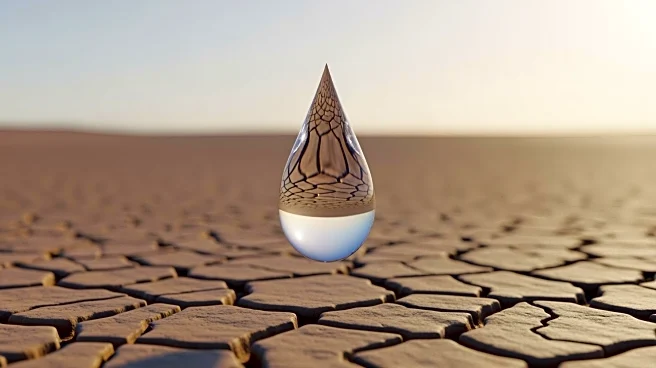What's Happening?
Scientists at the Italian Institute of Technology and the Free University of Bozen-Bolzano have developed a water-absorbing gel derived from red seaweed and marine algae. This innovative gel can absorb moisture up to 70 times its own mass and slowly release
it, providing nourishment to seeds and reducing the need for irrigation. The gel was tested in lab trials with Arabidopsis thaliana, where it demonstrated faster germination and stronger plant growth compared to traditional water-based systems. Unlike synthetic foams, this gel decomposes naturally, leaving no contaminants in the soil. The research team aims to incorporate sensors into the gel to monitor crop health and environmental conditions.
Why It's Important?
This development is significant as it addresses critical issues in modern agriculture, such as water scarcity and soil degradation. By reducing water consumption, the gel can help maintain farm productivity in arid regions, potentially transforming agricultural practices. The environmentally friendly nature of the gel, which decomposes without leaving pollutants, also tackles the problem of agricultural plastic waste. This innovation could lead to more sustainable farming methods, benefiting both the environment and communities facing water shortages. The potential to grow crops with minimal water usage could have far-reaching implications for food security and resource management.
What's Next?
The research team plans to integrate biodegradable sensors into the gel to track crop vitality and environmental factors during growth. This advancement could further enhance the efficiency and sustainability of farming practices. As the technology develops, it may be adopted in various agricultural settings, particularly in regions with limited water resources. The success of this gel could inspire further innovations in sustainable agriculture, encouraging the use of natural materials and reducing reliance on synthetic products.
Beyond the Headlines
The introduction of this gel could lead to a shift in agricultural practices, promoting the use of biodegradable materials and reducing environmental impact. It may also influence policy decisions regarding water management and agricultural sustainability. The gel's ability to improve plant resilience and nutrient uptake could contribute to healthier crops and potentially higher yields, supporting food production in challenging climates.

















